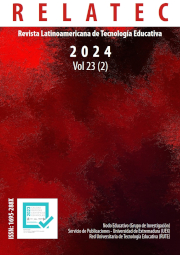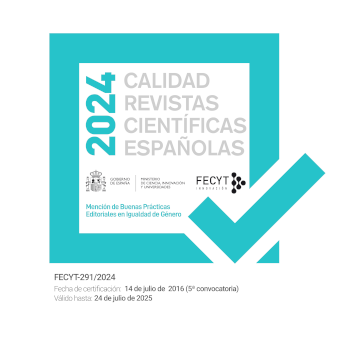La evaluación del Aprendizaje Basado en Juegos en contextos informales mediante ciencia de datos
DOI:
https://doi.org/10.17398/1695-288X.23.2.9Palabras clave:
Alfabetización Informacional, Desinformación, Ciencia de Datos, pensamiento críticoResumen
El auge del aprendizaje basado en juegos (ABJ) digitales ha generado un interés por explorar su eficacia, ya que su compleja combinación de narrativa e interactividad hace difícil evaluar hasta qué punto un videojuego consigue alcanzar los objetivos de aprendizaje planteados. Este reto se incrementa de manera exponencial cuando la sesión de juego se produce de manera espontánea en entornos informales, sin la supervisión de educadores ni la posibilidad de evaluar los conocimientos y las capacidades previas del jugador. Este trabajo presenta una metodología de análisis de experiencias de ABJ a partir del uso de ciencia de datos y las funcionalidades de recogida de información ofrecidas por las plataformas actuales de creación de videojuegos. La estrategia se aplica aquí al análisis de un simulador de redes sociales creado para promover la alfabetización informacional, enmarcado dentro del juego Julia: A Science Journey. El sistema registró datos sobre 436 partidas realizadas por 112 jugadores distintos durante seis meses y recopiló información sobre la repetición de partidas, la identificación de fake news o la velocidad de reacción. Los resultados sugieren que los jugadores aprenden a identificar fake news de manera más efectiva y rápida a medida que encadenan partidas. El éxito en la identificación de la desinformación también está relacionado con la temática, ya que los bulos vinculados a contenido científico son más fácilmente reconocidos que los relacionados con controversias políticas.
Descargas
Referencias
Alonso-Fernández, C., Calvo-Morata, A., Freire, M., Martínez-Ortiz, I., & Fernández-Manjón, B. (2019). Applications of data science to game learning analytics data: A systematic literature review. Computers & Education, 141, 103612. https://doi.org/10.1016/j.compedu.2019.103612
Bayeck, R. Y. (2020). Examining Board Gameplay and Learning: A Multidisciplinary Review of Recent Research. Simulation & Gaming, 51(4), 411–431. https://doi.org/10.1177/1046878119901286
Cabezuelo Lorenzo, F., & Manfredi, J. L. (2019). Posverdad, fake-news y agenda política en el discurso de Trump en Twitter. Historia y Comunicación Social, 24(2), 471–483.
Cano, A. R., Garcia-Tejedor, A. J., Alonso-Fernandez, C., & Fernandez-Manjon, B. (2019). Game Analytics Evidence-Based Evaluation of a Learning Game for Intellectual Disabled Users. IEEE Access, 7, 123820–123829. https://doi.org/10.1109/ACCESS.2019.2938365
Connolly, T., Stansfield, M., & Hainey, T. (2009). Towards the development of a games-based learning evaluation framework. In Games-based learning advancements for multi-sensory human computer interfaces: Techniques and effective practices (pp. 251–273). IGI Global.
DeJong, S. (2023). Playing With Fake News: State Of Fake News Video Games. International Journal of Games and Social Impact, 1(1), 94–111. https://doi.org/10.24140/ijgsi.v1.n1.05
Dyson, M., & Haselgrove, M. (2000). The effects of reading speed and reading patterns on the understanding of text read from screen. Journal of Research in Reading, 23(2), 210–223. https://doi.org/10.1111/1467-9817.00115
Fernández Galeote, D., & Hamari, J. (2021). Game-based Climate Change Engagement: Analyzing the Potential of Entertainment and Serious Games. Proceedings of the ACM on Human-Computer Interaction, 5(CHI PLAY), 1–21. https://doi.org/10.1145/3474653
Gee, J. P. (2007). What video games have to teach us about learning and literacy (Rev. and updated ed). Palgrave Macmillan.
Gómez-García, S., & Carrillo-Vera, J.-A. (2020). El discurso de los newsgames frente a las noticias falsas y la desinformación: Cultura mediática y alfabetización digital. Revista Prisma Social, 30, 22–46.
Hammer, J., To, A., Schrier, K., Bowman, S. L., & Kaufman, G. (2018). Learning and role-playing games. In Role-Playing Game Studies (pp. 283–299). Routledge.
Hauge, J. B., Berta, R., Fiucci, G., Manjon, B. F., Padron-Napoles, C., Westra, W., & Nadolski, R. (2014). Implications of Learning Analytics for Serious Game Design. 2014 IEEE 14th International Conference on Advanced Learning Technologies, 230–232. https://doi.org/10.1109/ICALT.2014.73
Lewandowsky, S., & van der Linden, S. (2021). Countering Misinformation and Fake News Through Inoculation and Prebunking. European Review of Social Psychology, 32(2), 348–384. https://doi.org/10.1080/10463283.2021.1876983
Maertens, R., Roozenbeek, J., Basol, M., & Van Der Linden, S. (2021). Long-term effectiveness of inoculation against misinformation: Three longitudinal experiments. Journal of Experimental Psychology: Applied, 27(1), 1–16. https://doi.org/10.1037/xap0000315
Mayer, I., Bekebrede, G., Harteveld, C., Warmelink, H., Zhou, Q., van Ruijven, T., Lo, J., Kortmann, R., & Wenzler, I. (2014). The research and evaluation of serious games: Toward a comprehensive methodology: The research and evaluation of serious games. British Journal of Educational Technology, 45(3), 502–527. https://doi.org/10.1111/bjet.12067
McCall, J. (2016). Teaching history with digital historical games: An introduction to the field and best practices. Simulation & Gaming, 47(4), 517–542.
McGonigal, J. (2011). Reality is broken: Why games make us better and how they can change the world. Penguin.
Modirrousta-Galian, A., Higham, P. A., & Seabrooke, T. (2023). Effects of inductive learning and gamification on news veracity discernment. Journal of Experimental Psychology: Applied. https://doi.org/10.1037/xap0000458
Mohsin, K. (2020). Defining’Fake News’. Available at SSRN 3675768.
Pitarch, R. C. (2018). An Approach to Digital Game-based Learning: Video-games Principles and Applications in Foreign Language Learning. Journal of Language Teaching and Research, 9(6), 1147. https://doi.org/10.17507/jltr.0906.04
Roozenbeek, J., Traberg, C. S., & Van Der Linden, S. (2022). Technique-based inoculation against real-world misinformation. Royal Society Open Science, 9(5), 211719. https://doi.org/10.1098/rsos.211719
Ross, A. S., & Rivers, D. J. (2018). Discursive Deflection: Accusation of “Fake News” and the Spread of Mis- and Disinformation in the Tweets of President Trump. Social Media + Society, 4(2), 205630511877601. https://doi.org/10.1177/2056305118776010
Rubio-Campillo, X., Marín-Rubio, K., & Corral-Vázquez, C. (2023). Using in-game analytics to explore learning dynamics of information literacy in a social media simulator. 17th European Conference on Games Based Learning, ECGBL 2023, 556–563.
Sadler, T. D., Romine, W. L., Stuart, P. E., & Merle-Johnson, D. (2013). Game-Based Curricula in Biology Classes: Differential Effects Among Varying Academic Levels: GAME-BASED CURRICULA. Journal of Research in Science Teaching, 50(4), 479–499. https://doi.org/10.1002/tea.21085
Squire, K. (2008). Video games and education: Designing learning systems for an interactive age. Educational Technology, 48(2), 17.
Squire, K. (2021). Making Games for Impact.
Su, Y., Backlund, P., & Engström, H. (2021). Comprehensive review and classification of game analytics. Service Oriented Computing and Applications, 15(2), 141–156. https://doi.org/10.1007/s11761-020-00303-z
Tahir, R., & Wang, A. I. (2017). State of the art in game based learning: Dimensions for evaluating educational games. European Conference on Games Based Learning, 641–650.
Tandoc, E. C., Lim, Z. W., & Ling, R. (2018). Defining “Fake News”: A typology of scholarly definitions. Digital Journalism, 6(2), 137–153. https://doi.org/10.1080/21670811.2017.1360143
Wardle, C., & Derakhshan, H. (2018). Thinking about ‘information disorder’: Formats of misinformation, disinformation, and mal-information. Journalism,‘Fake News’& Disinformation, 43–54.
Wickham, H. (2016). ggplot2: Elegant Graphics for Data Analysis. Springer-Verlag New York. https://ggplot2.tidyverse.org
Yee, N. (2014). The Proteus paradox: How online games and virtual worlds change us-and how they don’t. Yale University Press.
Descargas
Publicado
Número
Sección
Licencia
Derechos de autor 2024 Xavier Rubio-Campillo, Kevin Marín-Rubio, Celia Corral-Vázquez

Esta obra está bajo una licencia internacional Creative Commons Atribución-NoComercial-SinDerivadas 4.0.
Los autores/as que publiquen en esta revista aceptan las siguientes condiciones:
1. Los autores/as conservan los derechos de autor y ceden a la revista el derecho de la primera publicación, con el trabajo registrado con la licencia Creative Commons Reconocimiento-NoComercial-SinObraDerivada 4.0 International (CC BY-NC-ND), que permite a terceros utilizar lo publicado siempre que mencionen la autoría del trabajo y a la primera publicación en esta revista.
2. Los autores/as pueden realizar otros acuerdos contractuales independientes y adicionales para la distribución no exclusiva de la versión del artículo publicado en esta revista (p. ej., incluirlo en un repositorio institucional o publicarlo en un libro) siempre que indiquen claramente que el trabajo se publicó por primera vez en esta revista.
3. Se permite y recomienda a los autores/as a publicar su trabajo en Internet (por ejemplo en páginas institucionales o personales) antes y durante el proceso de revisión y publicación, ya que puede conducir a intercambios productivos y a una mayor y más rápida difusión del trabajo publicado (vea The Effect of Open Access).









